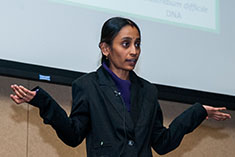January 29, 2018
Third annual K-State 3MT kicks off Feb. 13; participant registration now open
Submitted by Division of Communications and Marketing

Kansas State University is again offering an opportunity for graduate students to hone their science communication skills through the university's annual Three-Minute Thesis Competition, known as K-State 3MT.
Theses and dissertations can be more than 80,000 words and take hours to present, but graduate students in this competition have just three minutes and one slide to convey their often highly technical research to a lay audience.
In partnership with the Office of the Vice President for Research, the university's Graduate School, the K-State 3MT will be Tuesday, Feb. 13 and 27. Graduate students can compete at the Feb. 13 heats by registering online.
Preliminary rounds of the competition will be from 2:30-5:30 p.m. Feb. 13 at the College of Business Building. Top presenters from each heat will advance to the final competition at 5:30 p.m. Feb. 27 in the Alumni Center Banquet Room.
Both the preliminary heats and the final competition are open to the campus and general public.
Three-minute thesis competitions began in 2008 at the University of Queensland, Australia, and have since spread to at least 170 universities in 17 countries around the world. The challenge of the competition is to encourage graduate students to hone their science communication skills by learning to present a compelling oration on their thesis topic and its significance.
Other institutions in the United States that have participated in three-minute thesis competitions understand the importance it has not only on its students but on its community as well.
"Oklahoma State University uses our 3MT presenters to represent the diversity and value of graduate education to our constituents and community," said Ken Clinkenbeard, associate dean of Oklahoma State's Graduate College. "Our students learn how to speak concisely, be understandable and be engaging to public audiences, which is the best representation of the value of graduate education and the benefit to the public."
The University of Minnesota's 2015 three-minute thesis winner, Sakeen Kashem, doctoral student in medical science, appreciated the opportunity to improve his presentation and communication skills.
"The 3MT removes the crutches of complicated graphs, data, animation and multiple slides and allows you to really focus on the fundamentals, as to serve as a building block for a regular scientific presentation," Kashem said. "When I give talks now, I try to apply what I learned from the 3MT by making the tough concepts and complex data more approachable to the audience with the aid of key words and diagrams."
The top two presenters at the K-State 3MT will be awarded a scholarship, with the first-place winner receiving a $500 scholarship and serving as K-State's representative at the Midwestern Association of Graduate Schools' 3MT, April 4-6, in Grand Rapids, Michigan. Second place will be awarded a $250 scholarship. The audience will participate by voting for the people's choice winner, who receives a $125 scholarship.
Judging criteria is centered on three core competencies:
• Communication style: Was the thesis topic and its significance communicated in language appropriate to a nonspecialist audience?
• Comprehension: Did the presentation help the audience understand the research?
• Engagement: Did the oration make the audience want to know more?
The K-State 3MT is just one way the Graduate School and Graduate Student Council look to challenge graduate students to effectively communicate their research. The council and Graduate School also host professional development and research forums in the fall and spring semesters, which provide graduate students a time to practice presenting their research to a broad group of people.
Any questions about K-State's Three-Minute Thesis Competition can be directed to Megan Miller, mmmiller@k-state.edu, the Graduate School's student services coordinator.
